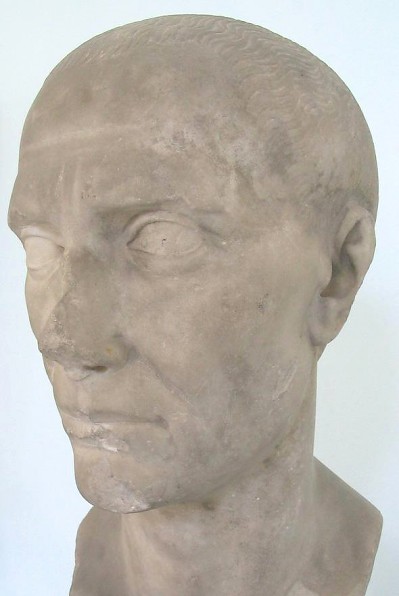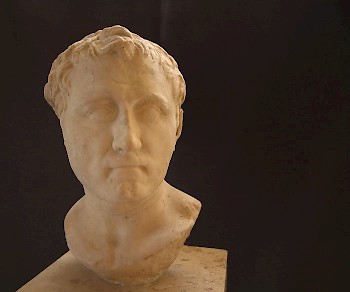First Triumvirate
Triumvir or tresvir: member of a college of three members. The expression is mostly used to describe the First Triumvirate (60 BCE; Pompey the Great, Crassus, and Julius Caesar) and Second Triumvirate (43 BCE; Marc Antony, Lepidus, and Octavian).

The Roman historian Titus Livy (59 BCE - 17 CE) described the First Triumvirate as "a conspiracy against the state by its three leading citizens", and this was exactly what it was. The three conspirators were
- general Pompey, who had defeated the Cilician pirates, conquered the declining Seleucid Empire and subdued Judaea, but discovered that the Senate would not ratify his organization of the Near East;
- Marcus Licinius Crassus, the richest men in Rome and the conqueror of Spartacus, but also a man whose senatorial career was not as brilliant as he would like;
- and his ally, the popular politician Julius Caesar, who had been elected consul for the year 59, but knew he would encounter a lot of opposition from conservative senators.

Although triumviratus was an official term, the First Triumvirate was a private agreement. Its members did not have a positive agenda, but simply wanted to bypass the Senate, obstruct the normal political process, and help each other. The deal was cemented by intermarriage: Pompey married Caesar's daughter Julia (it appears to have been a happy marriage); Caesar married Calpurnia, whose father Piso was a close friend of Crassus.
The deal gave something to every member. As consul Caesar saw to the swift ratification of Pompey's oriental acts; an agrarian law passed the Senate, distributing land among the urban poor and Pompey's soldiers; and Crassus received a financial agreement that was beneficial to his allies, the Roman knights.

Caesar, who went on to conquer Gaul, soon eclipsed his fellow-triumvirs, who controlled Rome. In 56, Caesar convinced them to continue the cooperation, but they demanded armies of their own. Pompey received Hispania and Crassus Syria, including a war against the Parthian empire. Two years later, Julia died, and in 53, Crassus was defeated and killed by his enemies. This was the end of the collaboration, and although Caesar and Pompey tried to prevent civil war, it was bound to come.